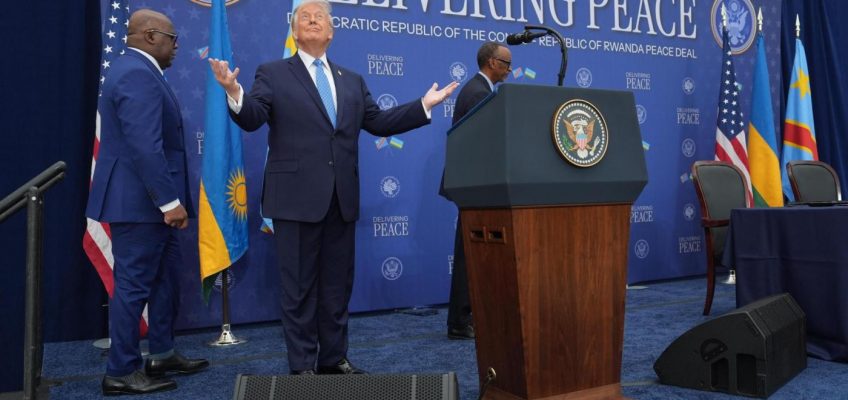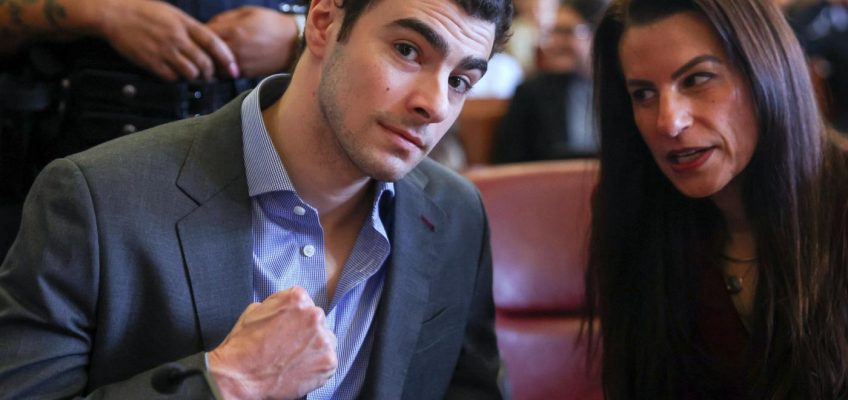By JUSTIN KABUMBA and MONIKA PRONCZUK
GOMA, Congo (AP) — A bomb explosion killed more than 30 people and wounded 20 others in eastern Congo following a dispute between the Congolese army and a pro-government militia, despite a deal signed in Washington and touted as a major step toward peace in the country.
Related Articles
‘It’s not safe to live here.’ Colombia is deadliest country for environmental defenders
A year after Bashar Assad fled, Syria struggles to heal
Climate change threatens Asia’s water and power systems, reports warn
Woman sentenced to 4 years in prison for blackmailing soccer star Son Heung-min
UN Palestinian aid agency says Israeli police ‘forcibly entered’ its Jerusalem compound
Residents and civil society leaders told The Associated Press that the FARDC, the Congolese army’s acronym, and Wazalendo, which has been helping the army combat the insurgents, clashed before they felt the blast in the town of Sange in South Kivu Sunday evening.
More than 100 armed groups vie for a foothold in mineral-rich eastern Congo near the border with Rwanda, most prominently the Rwanda-backed M23 group. The conflict has created one of the world’s most significant humanitarian crises with more than 7 million people displaced, officials say.
The explosion came less than a week after a U.S.-brokered peace agreement was finalized in an attempt to stop the ongoing war between the Congolese armed forces and the Rwanda-backed M23 rebel group in the eastern part of Congo. But the fighting continues, according to residents, civil society and analysts.
“FARDC soldiers were coming from the front lines and wanted to reach the city of Uvira,” said Faraja Mahano Robert, a civil society leader in Sange. “Once in Sange, they were ordered not to proceed, but some disagreed. That’s when they started shooting at each other, and then a bomb exploded, killing many people.”
Many residents have fled for safety, mainly in the direction of Burundi, eyewitnesses said Monday.
“This morning, we woke up a little better, but people are still leaving the Sange area,” said Amani Safari, a resident. “To the east of the town, there were clashes between the Wazalendo and the FARDC; two FARDC soldiers were killed around 7:30 AM.”
Another resident, David Kaserore, said: “It’s difficult to distinguish between the enemy and the FARDC, as they are killing all the civilians. We demand that the government end this war. We are tired.”
The army did not immediately reply to a request for comment.
Meanwhile, Congolese President Felix Tshisekedi accused Rwanda in a speech in parliament on Monday of violating the peace agreement and “organizing the plundering of our natural resources and destabilizing our institutions.”
Tshisekedi and his Rwandan counterpart, Paul Kagame, met U.S. President Donald Trump in Washington last week to sign the peace deal. Lauded by the White House as a “historic” agreement, the pact followed monthslong peace efforts. The agreement finalized a deal signed in June.
President Donald Trump, Rwanda’s President Paul Kagame and Democratic Republic of Congo President Felix-Antoine Tshisekedi, during a signing ceremony at the U.S. Institute of Peace, Thursday, Dec. 4, 2025, in Washington. (AP Photo/Evan Vucci)
“The very next day after the signing, units of the Rwandan Defence Forces conducted and supported heavy weapons attacks launched from the Rwandan town of Bugarama, causing significant human and material damage,” he said, calling the incident an “aggression by proxy” and refuting claims of internal rebellion.
Edouard Bizimana, the foreign minister of Burundi, accused Rwanda on Monday of “playing a double game. (Rwanda) claims to be negotiating and signing agreements, but in the meantime, it is intensifying attacks on the civilian population with kamikaze drones that kill instinctively.”
Burundian forces fight alongside the Congolese army to combat the M23 armed group.
Bizimana accused Rwanda of “indiscriminate attacks” on the civilians and troops, calling them “a provocation that Burundi cannot tolerate.”
He added his country has formally warned Kigali and “if this is repeated, Burundi has the right to prosecute those who have attacked Burundi.”
There was no immediate comment from Rwandan authorities.
Last week, residents said the fighting had intensified in South Kivu despite the deal. M23 and Congolese forces have repeatedly accused each other of violating the terms of the ceasefire agreed on earlier this year.
Earlier this year, M23 seized Goma and Bukavu, two key cities in eastern Congo, in a major escalation of the conflict.
The rebels in Congo are supported by about 4,000 troops from neighboring Rwanda, according to U.N. experts, and at times have vowed to march as far as Congo’s capital, Kinshasa, about 1,000 miles to the east.
Associated Press writers Saleh Mwanamilongo in Bonn, Germany, Jean-Yves Kamale in Kinshasa, Congo, and Renovat Ndabashinze in Bujumbura, Burundi contributed to this report.




